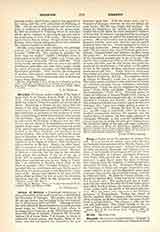

Gisbert, BLAISE, French rhetorician and critic; b. at Cahors, February 21, 1657; d. at Montpellier, February 21, 1731. Having entered the Society of Jesus in 1672, he taught the humanities, rhetoric, and philosophy, after which he devoted himself for a long time to preaching. The pleasure which Gisbert took in discussing pulpit eloquence with Lamoignon, the intendant of Languedoc, impelled him to write an essay on sacred eloquence, which he entitles “Le bon gout de l’eloquence chretienne” (Lyons, 1702). He spent ten years in retouching this essay, and augmented it considerably by adding to the rules examples drawn from Holy Scripture and the Fathers, especially St. John Chrysostom. The second edition appeared at Lyons in 1715 under the title “L’Eloquence chretienne clans l’idee et dans la pratique”. The work, which comprises twenty-three chapters, does not follow the rigorous order of a didactical treatise and is without the dryness of a scholastic manual. It has been rightly called “un livre eloquent sur l’eloquence”. It contains a series of talks on the faults to be avoided in the pulpit, on the qualities necessary to the preacher, on the matter and form of sermons, on oratorical action and decorum. Gisbert’s book sufficed to make its author famous not only among the Catholic clergy, but even among Protestant pastors. One of them, Jacques Lenfant (1661-1728) carefully annotated it, and another, Kornrumpff, translated it into German. An Italian translation also appeared during Gisbert’s lifetime, and later a Latin translation. The latest and best French edition is that of Crampon and Boucher (Paris, 1865). As a sort of supplement Gisbert wrote reflections on the collections of sermons printed in France from 1570 to about 1670. In this he considers, according to the somewhat narrow ideals of his age, ten orators before Bossuet and Bourdaloue. The MS. of this interesting “Histoire critique de la chaire francaise depuis Francois I” was lost, but was finally recovered by Msgr. Puyol and published by Fathers Cherot and Griselle, S.J., in the “Revue Bourdaloue”, 1902-04.
PAUL DEBUCHY

